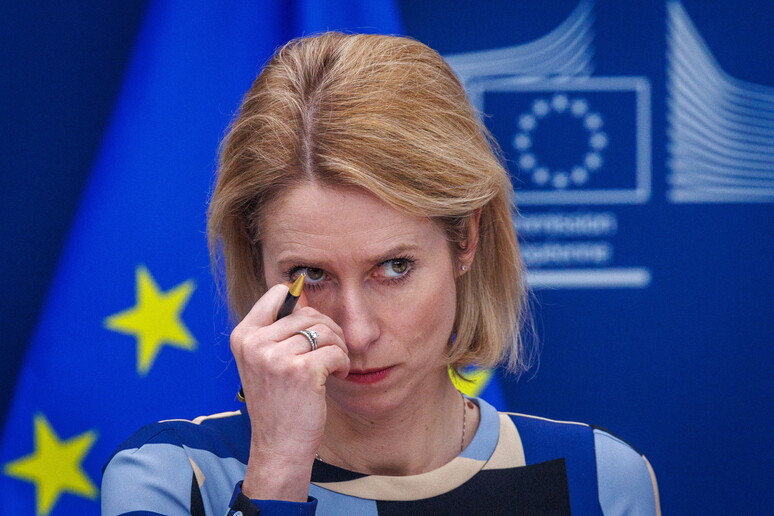Europe must be actively involved in
any peace negotiations on Ukraine, EU foreign policy chief Kaja
Kallas told the European Newsroom (enr) on Wednesday. She also
pushed back against US President Donald Trump's comments on
Ukraine and Gaza, emphasising Europe's role as a reliable global
partner.
Territorial integrity.
"Europe needs to be around the table" for peace negotiations to
end Russia's war against Ukraine, the European Union High
Representative for Foreign Affairs and Security Policy, Kaja
Kallas, told the European Newsroom (enr) in an interview on
Wednesday.
The former Estonian prime minister stressed that the outcome of
the war on the EU's eastern flank "will also very much influence
what is happening in Europe". According to her, a deal will not
be possible without Europeans and Ukrainians.
Earlier this week, US President Donald Trump raised the
possibility of Ukraine becoming "Russian someday", repeating
that he wants an agreement with Ukraine to gain access to the
country's rare earth deposits as a condition for continuing
Washington's support for Kyiv.
"Ukraine is a sovereign country with their territorial
integrity, and under international law these are always said to
be defended. So this is clear," she said.
Kallas added that Russia currently does not show a genuine
willingness for a peaceful resolution.
Kallas commented on the EU's relations with the new US
administration in Washington, highlighting the importance of
strengthening transatlantic ties and Europe's role in global
security issues. "It is important that the US remains our
closest ally," she said.
According to the EU foreign policy chief , the strength of the
EU is that "we are the predictable and reliable partner".
Ukraine has relied on financial and arms aid from Western allies
since Russia invaded the country on February 24, 2022. Kyiv's
allies have also enacted sanctions against key sectors of the
Russian economy to try to reduce Moscow's ability to finance the
war effort in Ukraine.
The almost three-year conflict has caused the destruction of
important infrastructure in various areas of Ukraine, as well as
an undetermined number of civilian and military casualties.
Speaking in Brussels also on Wednesday, US Secretary of Defense
Pete Hegseth said that it was "unrealistic" for Ukraine to
return to its pre-2014 borders, when Russia first began to
occupy its territories. Likewise, he downplayed the prospect of
Ukraine joining the North Atlantic Treaty Organization (NATO), a
32-nation strong military alliance.
The comments came as Trump and Russian President Vladimir Putin
held a "lengthy and highly productive" phone call, in which they
agreed for negotiations to end the war in Ukraine to begin
"immediately".
Middle East: "People can't be removed by force".
Kallas said that the European Union must also participate in
talks on the future of Gaza, where a ceasefire between the
terrorist group Hamas and Israel is currently in place. She
rejected Trump's idea of ;;turning Gaza into a "Riviera of the
Middle East" and relocating Palestinians to Jordan and Egypt.
Rejecting Trump's statements, Kallas argued that "people can't
be moved by force and any land grab would be illegal". She added
that Gaza "must never become a terrorist haven again".
Ethnic cleansing, understood as the forced expulsion of an
ethnic group from a territory, is a crime against humanity and
can be considered a crime of genocide, according to the United
Nations (UN).
The Arab League, made up of 22 states, has also dismissed
Trump's plans, insisting on the need to implement a two-state
solution which stipulates the creation of a Palestinian state in
Gaza and the occupied West Bank alongside the Israeli state.
The "European Union is supporting the two-state solution",
Kallas said. "Of course, the Israelis are worried about their
security, but without the Palestinians having their rights
respected there wouldn't be any security for Israel either," she
added, stressing that Gaza was an integral part of the future
Palestinian state as well.
USAID cuts - will the EU step in?.
After taking office last month, Trump decided to freeze funds
for the United States Agency for International Development
(USAID), which led to demands that the EU step in instead.
Asked whether the EU could step in and fill the gap after the
United States decided to suspend development aid, Kallas said
the EU is not "automatically filling the void with European
money because first, we don't have those funds, and second, I
think it's also the opportunity for us to grow our geopolitical
power," she told the enr.
Kallas complained that the EU currently supports many
organisations with substantial funds but is scarcely visible.
She said the current situation was an opportunity to make the
European flag more visible and to show people where the support
truly comes from.
She cited the Palestinian Authority and the UN Relief and Works
Agency for Palestine Refugees in the Near East (UNRWA) as
examples.
According to figures from the Organization for Economic
Co-operation and Development (OECD), in 2023, the US was the
world's largest single provider of public development aid,
amounting to nearly 65 billion Dollar (62.5 billion Euro).
However, collectively, the EU and its member states reached
nearly 96 billion Euro (100 billion Dollar) in the same period.
Germany contributed around 34 billion Euro, according to EU
data.
(continue).
(The content is based on news by agencies participating in the
enr, in this case Agerpres, AMNA, ANSA, CTK, dpa, EFE, FENA,
HINA, Lusa, Tanjug, TT).
ALL RIGHTS RESERVED © Copyright ANSA











